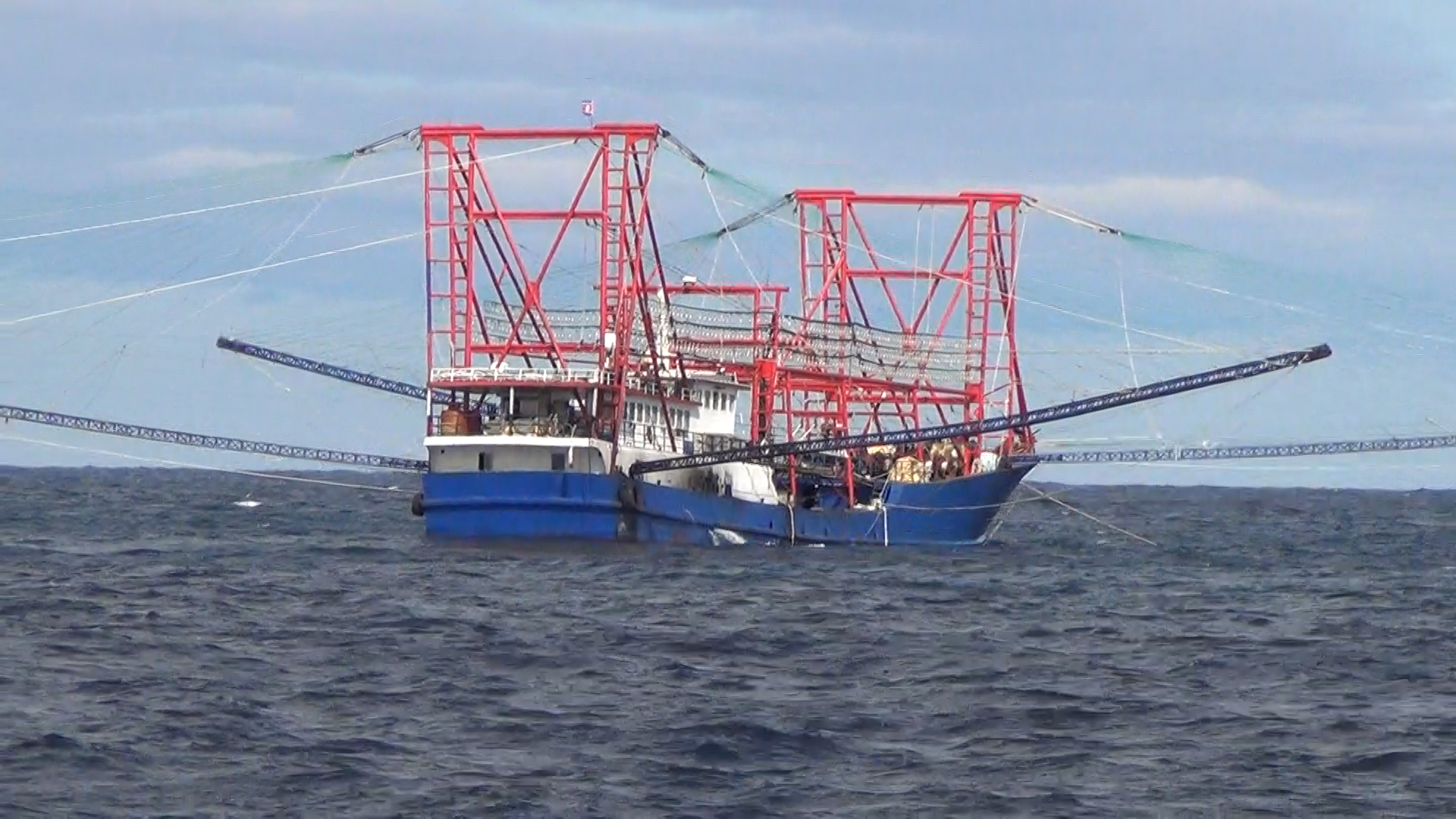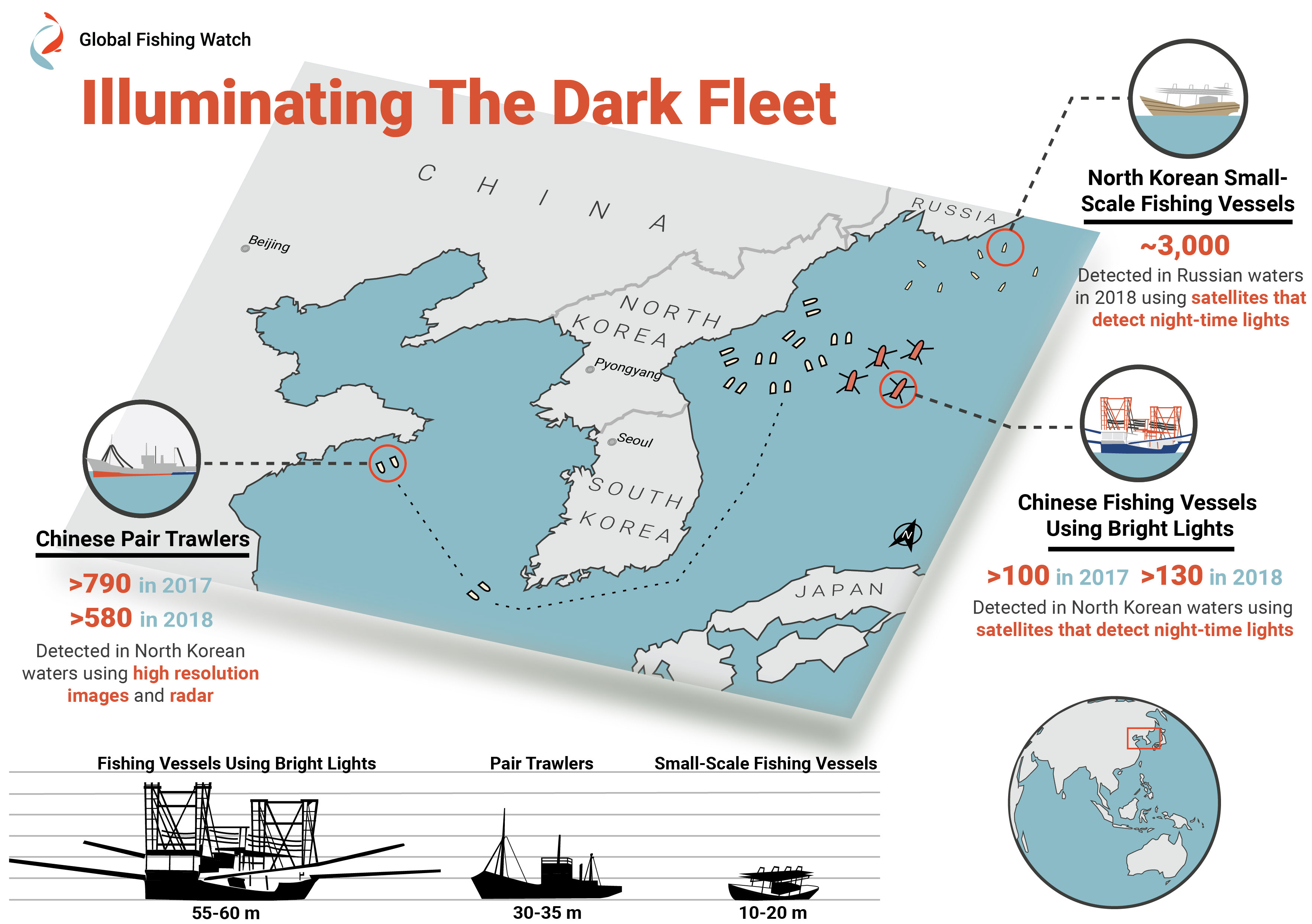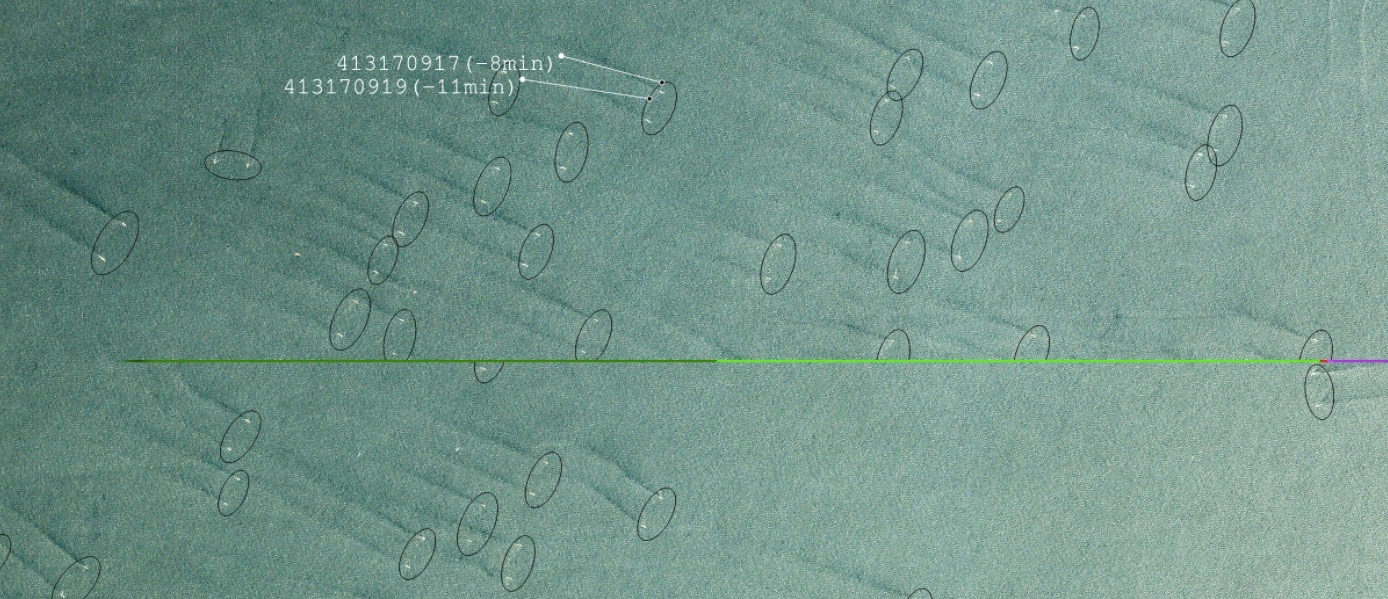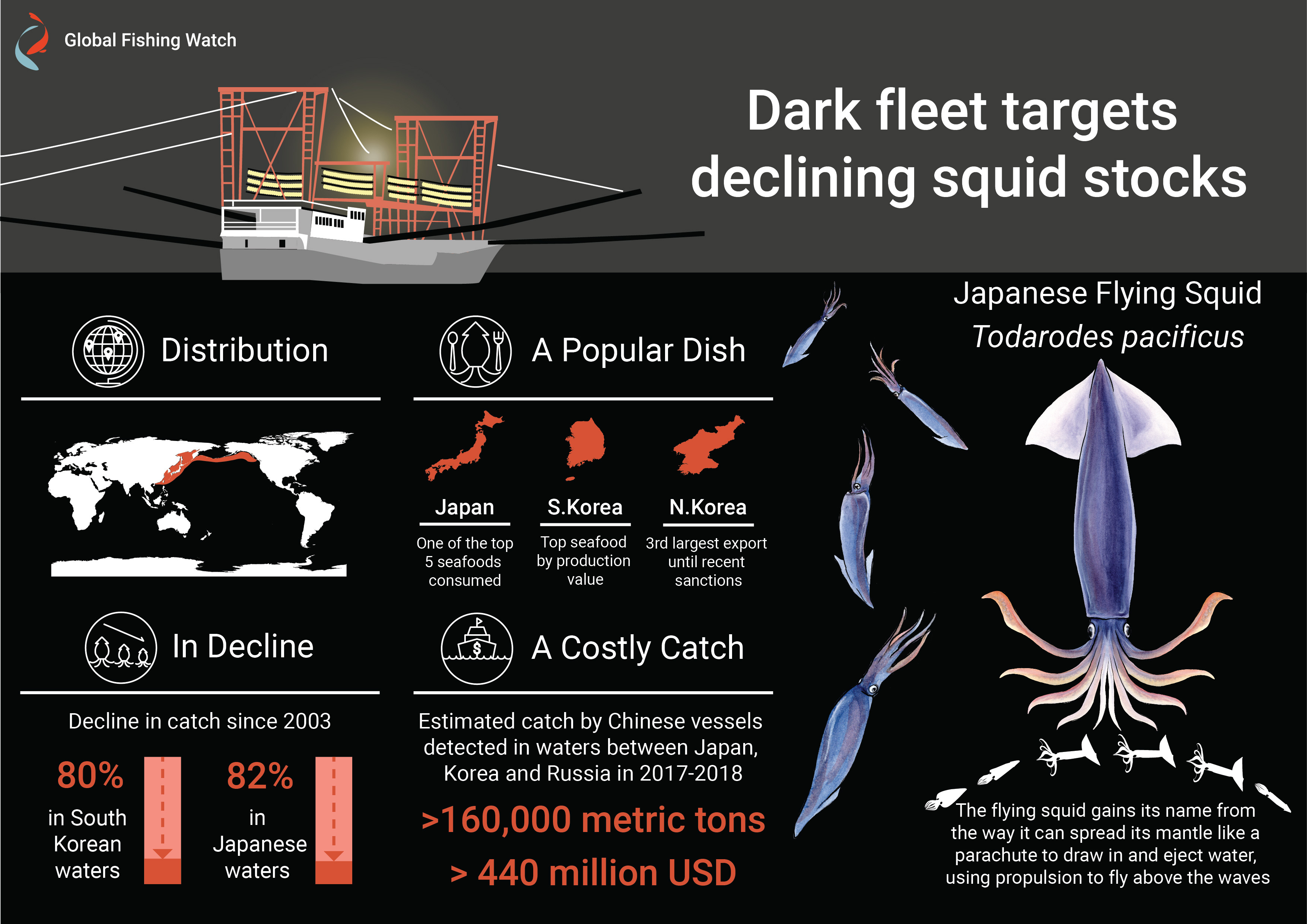
Satellite imagery has dragged "dark" fishing fleets out into the light.
Orbital observations have revealed extensive illegal fishing of Pacific flying squid (Todarodes pacificus) in the Pacific Ocean around Russia, Japan and North and South Korea in 2017 and 2018, a new study reports.
In fact, "extensive" may not be a strong enough word. More than 900 vessels of Chinese origin probably violated United Nations sanctions by fishing in North Korean waters in 2017, and another 700 did the same in 2018, the study found.
Related: 50 breathtaking images from Earth's oceans
These scofflaw ships likely hauled in more than 176,000 tons (160,000 metric tons) of Pacific flying squid over those two years, a catch worth about US $440 million, study team members said. That's nearly equivalent to the combined T. pacificus catch of Japan and South Korea over the same span.
"The scale of the fleet involved in this illegal fishing is about one-third the size of China's entire distant-water fishing fleet," said study co-lead author Jaeyoon Park, a senior data scientist at Global Fishing Watch, an international nonprofit organization dedicated to increasing ocean sustainability via greater transparency.
"It is the largest known case of illegal fishing perpetrated by vessels originating from one country operating in another nation's waters," Park said in a statement.
Get the Space.com Newsletter
Breaking space news, the latest updates on rocket launches, skywatching events and more!

Park and his colleagues tracked fishing activity in the Pacific around the Koreas, Japan and Russia, a big patch of poorly monitored ocean.
Many of the vessels plying these waters are dark, meaning they don't publicly broadcast their positions and don't show up in monitoring databases. So the researchers got a bird's-eye view, studying the region using four different types of satellite information.
For example, the researchers pored through Automatic Identification System (AIS) data, which is designed to help ships keep tabs on traffic in their area and avoid collisions. AIS signals stream continuously from transponders on ships, and these signals are often detected via satellite. But many ships don't beam out AIS signals, and the ones operating illegally are very unlikely to do so.
The team also looked at optical imagery gathered by Earth-observing satellites operated by San Francisco-based company Planet. The researchers analyzed wide-field photos captured by Planet's shoebox-sized Dove cubesats, as well as targeted imagery from larger, sharper-eyed SkySats.
Related: Photos of Earth by Planet satellites

In addition, Park and his colleagues scrutinized data from the Visible Infrared Imaging Radiometer Suite (VIIRS) instrument aboard Suomi NPP, a satellite operated jointly by NASA and the U.S. National Oceanic and Atmospheric Administration. VIIRS can spot brightly lit ships at night, which makes it well suited to hunt squid boats; these vessels usually operate after dark, drawing squid up from the depths with huge banks of very bright lights.
The researchers also used synthetic-aperture radar (SAR) imagery to hunt for large metal vessels in the region. The team used SAR data from several different satellites: the European Space Agency's Sentinel-1, the Japanese Space Exploration Agency's PALSAR-2, and RADARSAT-2, which is operated by the company Kongsberg Satellite Services.
Combining all of this information allowed the team to determine the extent of illegal fishing in the area — something that had never been done on this scale, team members said.
"These novel insights are now possible thanks to advances in machine learning and the rapidly growing volume of high-resolution, high-frequency imagery that was unavailable even a couple of years ago," co-author David Kroodsma, Global Fishing Watch research and innovation director, said in the same statement. "We've shown we can track industrial fishing vessels that are not broadcasting their locations."
The new study, which was published online today (July 22) in the journal Science Advances, suggests that the illegal vessels pose a significant threat to the management of the T. pacificus fishery. That fishery is extremely valuable — T. pacificus is the top seafood by production value in South Korea, and one of the top five seafoods eaten in Japan — and it's on an unsustainable trajectory. Since 2003, reported catches of T. pacificus have dropped by 80% and 82% in South Korean and Japanese waters, respectively, study team members said.

"Global fisheries have long been dominated by a culture of unnecessary confidentiality and concealment. Achieving a comprehensive view of fishing activity is an important step toward truly sustainable and cooperative fisheries management, and satellite monitoring is a key part of the solution," co-author Quentin Hanich, an associate professor at the Australian National Center for Ocean Resources and Security at the University of Wollongong, said in the same statement.
"This analysis represents the beginning of a new era in ocean management and transparency," Hanich added.
The team also determined that about 3,000 North Korean ships fished illegally in Russian waters in 2018, likely pushed so far afield by competition with the illegal Chinese vessels in their own backyard. Most of the North Korean boats are small and made of wood, and therefore not designed for such long open-ocean voyages.
Indeed, hundreds of North Korean fishing vessels have washed up on Japanese and Russian shores in recent years, study team members said.
"The consequences of this shifting effort for North Korean small-scale fishers are profound, and represent an alarming and potentially growing human rights concern," study co-author Katherine Seto, an assistant professor of environmental studies at the University of California, Santa Cruz, said in the same statement.
Mike Wall is the author of "Out There" (Grand Central Publishing, 2018; illustrated by Karl Tate), a book about the search for alien life. Follow him on Twitter @michaeldwall. Follow us on Twitter @Spacedotcom or Facebook.
Join our Space Forums to keep talking space on the latest missions, night sky and more! And if you have a news tip, correction or comment, let us know at: community@space.com.

Michael Wall is a Senior Space Writer with Space.com and joined the team in 2010. He primarily covers exoplanets, spaceflight and military space, but has been known to dabble in the space art beat. His book about the search for alien life, "Out There," was published on Nov. 13, 2018. Before becoming a science writer, Michael worked as a herpetologist and wildlife biologist. He has a Ph.D. in evolutionary biology from the University of Sydney, Australia, a bachelor's degree from the University of Arizona, and a graduate certificate in science writing from the University of California, Santa Cruz. To find out what his latest project is, you can follow Michael on Twitter.
-
Mergatroid It's odd that China cares so little about breaking UN sanctions, yet being a security counsel member, they must have voted for them.Reply
Personally, I can't say it's a big surprise. Nice job catching them at it though. -
pronjay Do we need to keep fishing when we can get all the necessary nutrients we need fish from sea algae? (see vegan DHA)Reply -
Wolfshadw Reply
Do we NEED to keep fishing? No.pronjay said:Do we need to keep fishing when we can get all the necessary nutrients we need fish from sea algae? (see vegan DHA)
Do we WANT to keep fishing? Absolutely!
Human beings are extremely resistant to change. You can show them all the benefits you want and they still would not change. For evidence, just look at the tobacco industry.
You can lead a horse to the trough, but you cannot make it drink.
-Wolf sends









